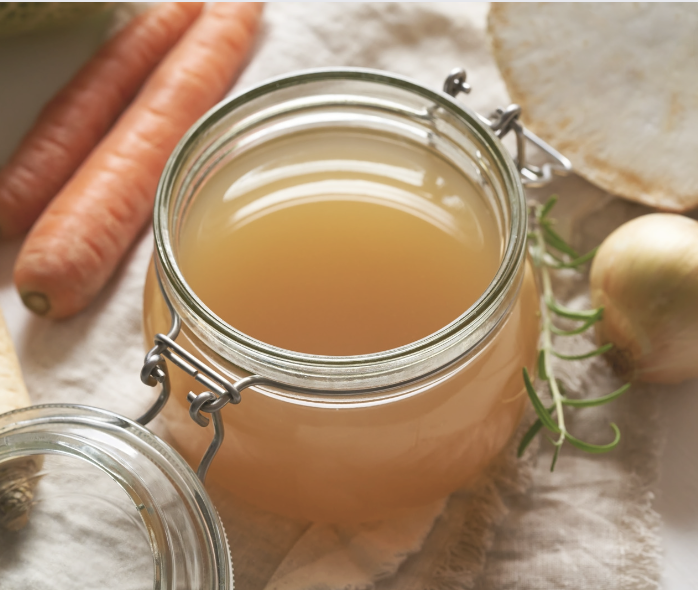If you’ve just had a C-section, you don’t need me telling you that your body just went through a major shift. While C-sections are one of the most common surgeries, they still require rest, recovery, and special care. In fact, it may take your body up to 8 weeks to fully heal.
I know this can be difficult with a new little one at home, but it is so important to try and prioritize your recovery so that you are able to show up for your baby the best way you can.
And while rest and support will be key in the recovery period, food and nutrition also play a crucial role in helping your body heal. This article will walk you through a few foods to prioritize during this time and which foods should stay off the plate.
The Foundation:
Before we go into the specifics of any one food or nutrient, making sure that we have a nutrient dense, whole food diet in place is key. This will serve as the foundation and be the ultimate determinant of how food is used to either support and heal the body or cause further harm.
So when in doubt, choose:
- whole grains, like oats and rice
- legumes, like lentils and mung beans
- lean protein, like eggs, wild fish, and bone broth
- starchy vegetables, like sweet potatoes and squash
- healthy fats, like nuts, seeds, avocado, and high quality oils and butter
- well cooked vegetables
- plenty of warm liquids
If you are breastfeeding, your calorie requirements are already higher than in pregnancy. Throw surgery on top of that and our daily calorie requirements are even higher. So know that now is not the time to skimp or to diet – add on the extra fats, prioritize the protein, and enjoy your food.
Include Iron:
It’s estimated that you lose twice the amount of blood during a C-section than in a vaginal birth. And what else do we get depleted in when we lose blood? Iron. The low iron post C-section is compounded by the fact that baby also took in a lot of our iron stores in the third trimester, making this mineral super important.
Foods that are high in iron include high quality, grass fed meat products and liver, oysters, and fish. For plant based foods, includes lentils, mung beans, legumes, cashews, pumpkin seeds, and some vegetables, like kale.
To increase the absorbability of iron, pair it with a source of vitamin C, such as oranges, lemon or lime juice, bell peppers, or berries (more about vitamin C below). And make sure to avoid consuming iron with calcium products, like dairy or supplements.
Choose Vitamin C:
Vitamin C helps to boost our immune system and support collagen production, a key player in repairing damaged tissues. Choose fruits and vegetables such as oranges, lemons & limes, melons, papaya, mango, berries, sweet potatoes, tomatoes and broccoli.
Prioritize Protein:
Protein is needed to help the growth of new cells and facilitate the healing process. As such, making sure to include high quality protein at each meals will be incredibly important in the week after your C-section. Make sure to choose:
- High quality AWA or Certified Humane eggs
- 100% grass-fed, full fat dairy
- 100% grass fed meat products
- Organic legumes and beans
Focus On Fiber:
After a C-section, constipation is fairly normal so fiber can help to keep things moving along. We want to get in a combination of both soluble and insoluble fiber to promote optimal digestive health. Fiber can be found in whole grains, fruits and vegetables. Just remember to increase water intake as you increase fiber.
Try Bone Broth:
Bone broth is a warm broth made from various animal bones that has long been used as a healing remedy. Bone broth is high in all the collagen-supporting amino acids, such as glycine, hydroxyproline, and proline. Bone Broth is also loaded with electrolytes and serves as a great source of fluids, both of which are recommended to restore balance in the body post delivery.
For extra support, use bone broth as the base of hearty stews, soups and curries.
A Final Note:
If I could leave you with one takeaway, it is this: these next 6 weeks (minimum) are meant to be a time of nourishing, healing, and protecting your body. NOT a time of trying to lose weight. As mentioned above, calorie and nutrient requirements are higher during the postpartum period, and even HIGHER if you’ve gone through surgery.
So push against the “bounce back” culture mindset and embrace the rest your body needs right now.
No restriction. No “low” carb, “low” fat, “low” anything. No detoxes.
Instead, fill yourself up with self love, quality time with loved ones, rest and repair, nourishment, abundance, and the new stage of life that you are entering in.
Check out my podcast on postpartum and body image or postpartum nutrition with x HATCH here. Or feel free to reach out via discovery call to learn more.
Written By: Amanda Wahlstedt, RDN

share this post >>
share this post >>